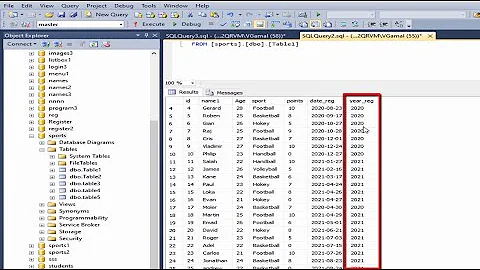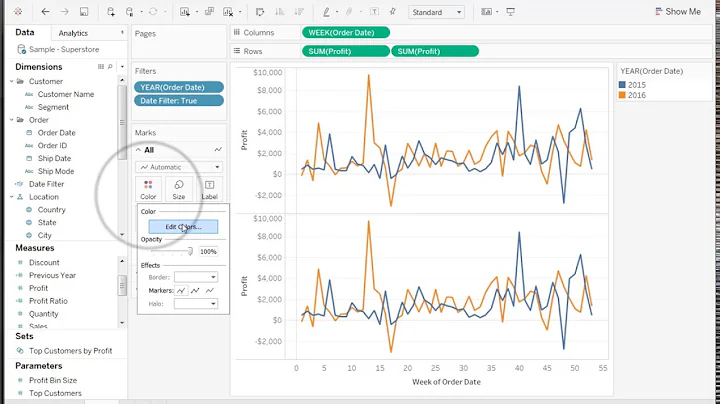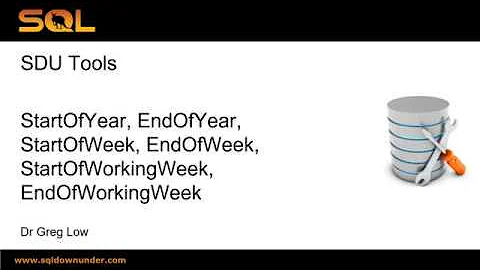yearweek on SQL server
If you look at the ISO_Week datepart definition at http://msdn.microsoft.com/en-us/library/ms174420.aspx, you'll see the following:
ISO 8601 includes the ISO week-date system, a numbering system for weeks. Each week is associated with the year in which Thursday occurs...
The numbering system in different countries/regions might not comply with the ISO standard.
Since January 1, 2014 was a Wednesday; January 2, 2014 was the first Thursday of the year and thus week 1 of 2014 (according to ISO 8601).
Furthermore, looking at the MySQL definitions for yearweek and week, there are several mode options (http://dev.mysql.com/doc/refman/5.5/en/date-and-time-functions.html#function_week)
So, I think you're going to have to write your own yearweek function for the week counting rule you want:
CREATE FUNCTION dbo.yearweek(@date date)
RETURNS INT
as
begin
set @date = dateadd(dd,-datepart(dw,@date)+1, @date)
return datepart(year,@date)*100 + datepart(week,@date)
end
go
select dbo.yearweek('2013-12-31'), dbo.yearweek('2014-01-01')
NOTE: I haven't fully tested this code, and I'm not sure exactly what your requirements are. This is just meant as an example of the type of process you need to follow.
Related videos on Youtube
SQL.injection
Updated on October 04, 2022Comments
-
SQL.injection over 1 year
How can I extract the year and week combination from a date in SQL Server using T-SQL and have it match the MySQL
yearweekresult?For example these MySQL queries (Click here for MySQL SQL Fiddle):
SELECT yearweek('2013-12-31'); SELECT yearweek('2014-01-01');This returns
201352for both dates. That is the expected result.But in SQL Server...
- datepart works as expected for the year extract
- sometimes datepart does not return the expected value for
iso_week
The MySQL result cannot be achieved with this T-SQL query...
SELECT datepart(year, @dt) * 100 + datepart (iso_week, @dt);T-SQL versions of the MySQL queries above (Click here for T-SQL SQL Fiddle):
SELECT datepart(year, '2013-12-31') * 100 + datepart (iso_week, '2013-12-31'); SELECT datepart(year, '2014-01-01') * 100 + datepart (iso_week, '2014-01-01');The result is
201352for the first date and201401for the second date.However, this is not the expected result because...
- 2014-01-01 belongs to the last week of 2013
- So the expected result is
201352
Do any of you more experienced T-SQL developers know how to extract the year/week of a given date and have this match what I see in MySQL?
I need to have the week start on Monday. This is why I am using
iso_week. I have tested the results withweekanyway and found the same issue. This query also produces201401when201352is expected.SELECT datepart(year, '2014-01-01') * 100 + datepart (week, '2014-01-01'); -
SQL.injection over 10 yearshow exactly "SELECT YEAR('2014-01-01') AS [YEAR] , DATEPART(WEEK, '2014-01-01')" is supposed to look like 2013-52? I really don't understand ... because the the 1st of January of 2014 belongs to the last week of 2013...
-
SQL.injection over 10 yearsthere is no typo on the iso week, I want the week to start on Monday, therefore I use ISO_WEEK.
-
 M.Ali over 10 yearsI have selected both values separately for demo purpose , if you want me to concatenate it as well see my update now.
M.Ali over 10 yearsI have selected both values separately for demo purpose , if you want me to concatenate it as well see my update now. -
SQL.injection over 10 yearsdid you tried your query? don't you understand the problem is that 2014-01-01 is week 52 of 2013?
-
 Jon Jaussi over 10 years@SQL.injection testing a few different dates with @chezy525's function. What would you expect for this result?
Jon Jaussi over 10 years@SQL.injection testing a few different dates with @chezy525's function. What would you expect for this result?SELECT '2012-01-02' as MyDate, dbo.yearweek('2012-01-02') as yearweek_result. I see 201153. I think you would want 201201.SELECT '2014-01-01' as MyDate, dbo.yearweek('2014-01-01') as yearweek_resultdoes give the expected result 201352 -
 Rich over 10 yearsdidn't say there was a typo, just that you might want a different parameter. read the description.
Rich over 10 yearsdidn't say there was a typo, just that you might want a different parameter. read the description.











